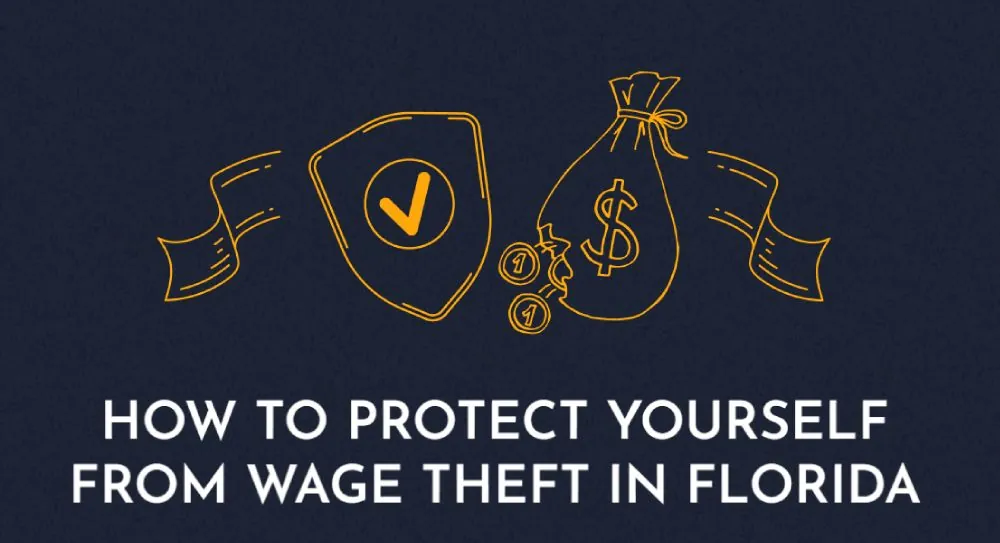
In Florida, if an employer fails to pay due wages, an employee can file a civil theft claim. Before taking legal action, the employee must send written notice to the employer and give them 30 days to resolve the issue by paying the owed amount.
Sometimes employers depend on their employees not knowing their rights or misclassifying their employees to avoid paying full wages to their workforce. Once you understand the work benefits you are entitled to, you can recover them from your employer and hold it accountable for its misconduct. And Brenton Legal, PA, can help ensure that you receive everything you deserve. Our experienced wage and hour attorneys can successfully handle any employment dispute that you are facing.
How Can Wage Theft Be Prevented?
You can stop wage theft before it becomes an issue by keeping track of applicable laws, your hours, your job duties, and your paychecks. When your wages don’t reflect the hours you have worked, you can consult an attorney to confront your employer about its failure to pay you. Below is a list of wage rights you should know to protect yourself in the workplace.
Know Your Minimum Wage Rights
If you are a non-exempt employee in Florida, your employer must pay you at least $11 per hour. And the Florida minimum wage is set to increase by $1 every year until it reaches $15 per hour on September 30, 2026. One way an employer may mislead you through negligence or ill intentions is by paying you the federal minimum wage rate of $7.25. But while the federal minimum wage is only $7.25 per hour, federal law requires that employers pay their state’s minimum wage rate if it is higher.
Know Your Overtime Rights
Even if your employer pays you the proper minimum wage, it might cut corners on your paycheck by neglecting to pay you overtime premiums. Whenever a non-exempt employee works more than 40 hours in a workweek, their employer must pay them 1.5 times their regular pay rate for any working time over 40 hours. You should make sure you know how many hours you work each week, and you should regularly inspect your paycheck so that you can quickly catch any shortcomings when it comes to your overtime pay.
Know Your Break Rights
Your time at work is worth money, and that includes your break time. You do not have a legal right to break time at work, but if you receive short work breaks that last between 5 and 20 minutes, your employer cannot treat them as unpaid breaks. An employer that doesn’t pay you for a short break commits wage theft and could be subject to paying damages or fines.
Know Your Contract Rights
While minimum wage is the default, employers can choose to pay or provide more to their employees. So if an employer has promised to pay you more than minimum wage or give you benefits such as paid lunches or paid vacation, it must abide by that promise. You can sue your employer for a failure to comply with the terms of an employment contract.
Know If You Are Truly Exempt
One sneaky way that employers try to get out of fully paying their employees is by claiming their employees are exempt or independent contractors. The Federal Fair Labor Standards Act does not require employers to pay minimum wage or overtime to exempt employees who include:
- Administrative employees,
- Professional employees,
- Computer employees,
- Highly compensated employees,
- Outside salespeople, and
- Executive employees.
But having one of the above titles does not mean that you are exempt from overtime and minimum wage laws. Your position makes you exempt only if your primary job duties fall in line with the work an exempt employee would do.
Employers also do not have to comply with wage and hour laws if their workers are independent contractors. But not every worker who is paid like an independent contractor is truly an independent contractor. If the following statements apply to your work and your relationship with your boss, you are likely not an independent contractor:
- You do not have a business that is separate from your employer’s business,
- You are not a highly skilled worker,
- Your relationship with your employer is continuous and exclusive,
- You are performing work for a business,
- You do your work under the supervision of your boss,
- You or your employer believe that you have an employment relationship,
- Your employer pays you for your time instead of by job,
- Your employer provides you with supplies and tools to do your work,
- The work you do is part of your employer’s regular business, and
- Your employer controls what work you do and how you do your work.
Similar to exempt positions, the title of “independent contractor” does not excuse your employer from paying you minimum wage and overtime if the above factors apply to your work. When an employer misclassifies you or otherwise fails to comply with minimum wage laws, it might be required to pay back wages, civil penalties, and attorney fees.
What Can You Do About Wage Theft in Florida?
Florida law requires you to first notify your employer about its non-compliance with wage and hour laws. After putting your employer on notice, you must give it 15 days to fix the problem. Having an attorney help you with this notice is often the best way to obtain what you deserve and preserve your case moving forward.
If you and your employer cannot come to an agreement after you put your employer on notice, you can file a wage complaint with the U.S. Department of Labor’s Wage and Hour Division or with your county. You also have the option of filing a lawsuit in court.
Call Us Today
Whatever challenges you face in your workplace, we can help you fix them. Brenton Legal is highly respected among our clients and peers, and we give straightforward legal advice to workers all over the State of Florida. No case is too small or too big for our attention, and we want to help you obtain what you have earned from your employer. Call us at 954-639-4644, or reach out to us online when you need help.

